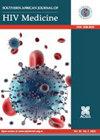Knowledge and perceptions of male immigrants in Leeds (UK) towards male circumcision as an HIV prevention strategy
IF 1.6
4区 医学
Q4 INFECTIOUS DISEASES
引用次数: 3
Abstract
Background The World Health Organization has accepted and recommended medical male circumcision (MMC) as an HIV prevention strategy. Despite the advantages of MMC, the rate of uptake of this practice among immigrants and the general population in the United Kingdom (UK) is low, yet the procedure is provided in public and private health facilities. The role of negative perception and its contribution to low circumcision rates is unknown. Objectives Since immigrants are a key group that is vulnerable to HIV in the UK, this study aimed at understanding their knowledge and perceptions with regard to MMC. Methods We enrolled 10 participants who were purposively selected using snowball recruitment methods. Data were collected during individual in-depth interviews using semi-structured interview guides. Responses were audio recorded, transcribed and analyzed using thematic analysis. Appropriate themes were generated from the data collected. Results We found that the majority looked at male circumcision (MC) as a practice to fulfill their cultural and religious obligations rather than as an HIV protection method. Few participants showed belief and certainty that MC or MMC was effective in HIV prevention hence limited knowledge. They also expressed perceived danger. This included fear of pain, complications from the procedure and possible infections when carried out through traditional means. These dangers discouraged study participants from accessing MMC. Conclusion Male circumcision is mainly practiced to fulfill cultural and religious norms, but is not seen as a credible HIV prevention strategy.利兹(英国)男性移民对男性包皮环切术作为艾滋病预防策略的认识和看法
背景世界卫生组织已接受并建议将医学男性包皮环切术(MMC)作为预防艾滋病毒的策略。尽管MMC具有优势,但在英国移民和普通人群中,这种做法的接受率很低,但这种程序是在公共和私人卫生机构中提供的。负面认知的作用及其对低包皮环切率的影响尚不清楚。目的由于移民是英国易感染艾滋病毒的关键群体,本研究旨在了解他们对MMC的知识和看法。方法我们招募了10名参与者,他们是用滚雪球招募的方法有目的地选择的。数据是在个人深度访谈中使用半结构化访谈指南收集的。回答被录音、转录并使用主题分析进行分析。从收集的数据中产生了适当的主题。结果我们发现,大多数人将男性包皮环切术视为一种履行文化和宗教义务的做法,而不是一种保护艾滋病毒的方法。很少有参与者相信和确信MC或MMC在预防艾滋病毒方面是有效的,因此知识有限。他们还表达了感知到的危险。这包括对疼痛的恐惧、手术并发症以及通过传统方法进行时可能出现的感染。这些危险阻碍了研究参与者使用MMC。结论男性包皮环切术主要是为了满足文化和宗教规范,但并不是一种可靠的HIV预防策略。
本文章由计算机程序翻译,如有差异,请以英文原文为准。
求助全文
约1分钟内获得全文
求助全文
来源期刊
CiteScore
2.80
自引率
11.80%
发文量
41
审稿时长
>12 weeks
期刊介绍:
The Southern African Journal of HIV Medicine is focused on HIV/AIDS treatment, prevention and related topics relevant to clinical and public health practice. The purpose of the journal is to disseminate original research results and to support high-level learning related to HIV Medicine. It publishes original research articles, editorials, case reports/case series, reviews of state-of-the-art clinical practice, and correspondence.

 求助内容:
求助内容: 应助结果提醒方式:
应助结果提醒方式:


